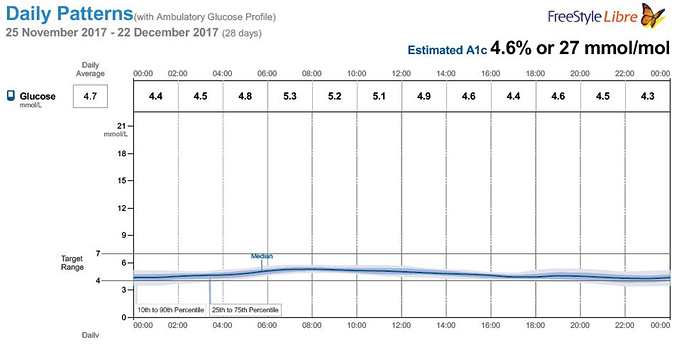I have been LCHF and Keto for the last 6 years. When I started I was 100 lbs. overweight but I always had great blood sugar. Over the years my fasting blood sugar has crept up. There is no way eating 20 carbs or less a day and the proper amount of protein I could have higher blood sugar. Any thoughts?
Higher blood sugar on a long term keto/low carb diet?
It is common and if your A1c is normal, you have nothing to worry about. It is called physiological insulin resistance (NOT pathological). Dr. Peter D. of hyperlipid has written on the topic.
How I understand it is that over time, the body adjusts to keto by dialing down insulin production due to lack of need. When the body prepares for starting the day, gluconeogenisis ramps up and produces glucose for the organs that need it. It should be called glucose sparing.
Yep, this question was just raised on the latest keto talk podcast. Makes perfect sense
I think a lot of people (non diabetic) just don’t test b.g. and as a result, don’t even know that they have higher f.b.g… If their doc orders a f.b.g., it comes back in the normal range because by the time the blood draw is done, it has lowered.
Before keto my resting blood sugar was 80-85 and post meal was 110-120. Now my resting blood sugar is 100-105 and post meal usually never goes above 115 (usually around 110). Is there a point in time where this 100-105 will reduce to say… 90? I have been doing keto strictly for 6 months or so.
Try to take it in the evening. Is it lower?
For instance, here’s mine in December 2017:
There’s a 1 point different between high and low in European units. That’s 18 in US units. 5.3x 18 = 95.4; 4.3x18=77.4. Higher in the morning, lower in the evening.
Dr. Paul Mason, an Australian physician who specialises in sport medicine, treats a lot of patients with insulin resistance, by putting them on a ketogenic diet. His clinical opinion is that serum glucose that fluctuates within a narrow range, even if it’s higher, is better than lower serum glucose that has high spikes. I’d say that you are far better off, by that criterion.
That’s good to hear. I never tested my levels until a few months into keto and until recently mine was between 100 to 110 fasting and throughout the day. Lately I sometimes have lower numbers, and a couple of times I’ve even seen it in the 80s during the day. That had me thinking I should try and work to get it in the 80s more often, but now I think I just won’t worry about it. I switched to carnivore a month ago and I’m seeing a lot more improvement than I did on keto, so as long as everything else is moving in the right direction I’ll just trust my blood sugar will eventually lower as my body heals.
I still think that the A1C test is a better indicator as it is a look at what has been happening over a period of months.
Also, according to Dr. Kraft, and his extensive research, blood sugar regulation issues come AFTER insulin resistance has become established.
The best way to control insulin is through diet… ketogenic diet. If you are already doing that, then I wouldn’t worry about the rest. Adherence and time will iron out any wrinkles.

